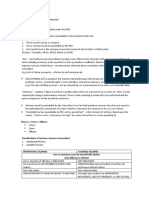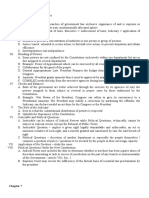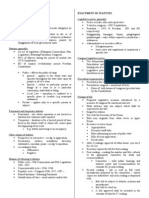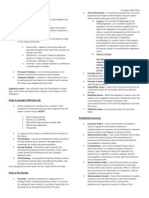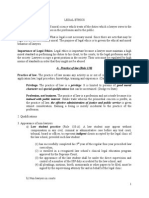Requisites of Judicial Review
Requisites of Judicial Review
Uploaded by
Jernel JanzCopyright:
Available Formats
Requisites of Judicial Review
Requisites of Judicial Review
Uploaded by
Jernel JanzOriginal Description:
Copyright
Available Formats
Share this document
Did you find this document useful?
Is this content inappropriate?
Copyright:
Available Formats
Requisites of Judicial Review
Requisites of Judicial Review
Uploaded by
Jernel JanzCopyright:
Available Formats
SEPARATION OF POWERS
- The separation of powers is a fundamental principle in our system of government. It obtains not
through express provision but by actual division in our Constitution. Each department of the government
has exclusive cognizance of matters within its jurisdiction, and is supreme within its own sphere. But it
does not follow from the fact that the three powers are to be kept separate and distinct that the
Constitution intended them to be absolutely unrestrained and independent of each other. The
Constitution has provided for an elaborate system of checks and balances to secure coordination in the
workings of the various departments of the government. [Angara vs. Electoral Commission (1936)]
CHECKS AND BALANCES
- It does not follow from the fact that the three powers are to be kept separate and distinct that the
Constitution intended them to be absolutely unrestrained and independent of each other. The
Constitution has provided for an elaborate system of checks and balances to secure coordination in the
workings of the various departments of the government. For example, the Chief Executive under our
Constitution is so far made a check on the legislative power that this assent is required in the enactment
of laws. This, however, is subject to the further check that a bill may become a law notwithstanding the
refusal of the President to approve it, by a vote of two-thirds or three-fourths, as the case may be, of the
National Assembly. The President has also the right to convene the Assembly in special session whenever
he chooses. On the other hand, the National Assembly operates as a check on the Executive in the sense
that its consent through its Commission on Appointments is necessary in the appointments of certain
officers; and the concurrence of a majority of all its members is essential to the conclusion of treaties.
Furthermore, in its power to determine what courts other than the Supreme Court shall be established,
to define their jurisdiction and to appropriate funds for their support, the National Assembly controls the
judicial department to a certain extent. The Assembly also exercises the judicial power of trying
impeachments. And the judiciary in turn, with the Supreme Court as the final arbiter, effectively checks
the other departments in the exercise of its power to determine the law, and hence to declare executive
and legislative acts void if violative of the Constitution. [Angara vs. Electoral Commission (1936)]
Judicial Review
Constitutional Basis
The power of judicial review is conferred on the judicial branch of the government in Section 1, Article
VIII of our present 1987 Constitution:
SECTION 1. The judicial power shall be vested in one Supreme Court and in such lower courts as may be
established by law.
Judicial power includes the duty of the courts of justice to settle actual controversies involving rights
which are legally demandable and enforceable, and to determine whether or not there has been a grave
abuse of discretion amounting to lack or excess of jurisdiction on the part of any branch or
instrumentality of the government. (Emphasis supplied)
[Francisco vs House of Representatives, G.R. No. 160261, November 10, 2003]
Theory, Rationale, and Restrictions of Judicial Review
The Constitution is a definition of the powers of government. Who is to determine the nature, scope and
extent of such powers? The Constitution itself has provided for the instrumentality of the judiciary as the
rational way. And when the judiciary mediates to allocate constitutional boundaries, it does not assert
any superiority over the other departments; it does not in reality nullify or invalidate an act of the
legislature, but only asserts the solemn and sacred obligation assigned to it by the Constitution to
determine conflicting claims of authority under the Constitution and to establish for the parties in an
actual controversy the rights which that instrument secures and guarantees to them. This is in truth all
that is involved in what is termed "judicial supremacy" which properly is the power of judicial review
under the Constitution. Even then, this power of judicial review is limited to actual cases and
controversies to be exercised after full opportunity of argument by the parties, and limited further to the
constitutional question raised or the very lis mota presented. Any attempt at abstraction could only lead
to dialectics and barren legal questions and to sterile conclusions unrelated to actualities. Narrowed as
its function is in this manner, the judiciary does not pass upon questions of wisdom, justice or
expediency of legislation. More than that, courts accord the presumption of constitutionality to
legislative enactments, not only because the legislature is presumed to abide by the Constitution but
also because the judiciary in the determination of actual cases and controversies must reflect the
wisdom and justice of the people as expressed through their representatives in the executive and
legislative departments of the government. [Angara v. Electoral Commission, G.R. No. 45081, July 15,
1936 cited in Francisco vs House of Representatives, G.R. No. 160261, November 10, 2003]
By virtue of this prerogative, the Supreme Court either checks or legitimates the acts of a coordinate
department, challenged in an appropriate legal proceeding. The decision rendered then, whether one of
approval or of rejection, of validity or of unconstitutionality, is controlling. [Mitra vs Comelec, G.R. No. L-
56503, April 4, 1981]
Requisites of Judicial Review
The Court's power of judicial review may be exercised in constitutional cases only if all the following
requisites are complied with, namely:
(1) the existence of an actual and appropriate case or controversy;
(2) a personal and substantial interest of the party raising the constitutional question;
(3) the exercise of judicial review is pleaded at the earliest opportunity; and
(4) the constitutional question is the lis mota of the case.
[See Montesclaros vs. Comelec, G.R. No. 152295, July 9, 2002]
A. Actual Case or Controversy
An actual case or controversy is one that involves a conflict of legal rights, an assertion of opposite legal
claims susceptible of judicial resolution; the case must not be moot or academic or based on extra-legal
or other similar considerations not cognizable by a court of justice. Stated otherwise, it is not the mere
existence of a conflict or controversy that will authorize the exercise by the courts of its power of review;
more importantly, the issue involved must be susceptible of judicial determination. Excluded from these
are questions of policy or wisdom, otherwise referred to as political questions. [Garcia v. Executive
Secretary, G.R. No. 157584, April 2, 2009]
A justiciable controversy has been defined as, a definite and concrete dispute touching on the legal
relations of parties having adverse legal interests which may be resolved by a court of law through the
application of a law. Courts have no judicial power to review cases involving political questions and as a
rule, will desist from taking cognizance of speculative or hypothetical cases, advisory opinions and in
cases that has become moot. Subject to certain well-defined exceptions courts will not touch an issue
involving the validity of a law unless there has been a governmental act accomplished or performed that
has a direct adverse effect on the legal right of the person contesting its validity. [Cutaran vs DENR, G.R.
No. 134958, January 31, 2001]
Prematurity
In PACU vs. Secretary of Education [G.R. No. L-5279, October 31, 1955] the petition contesting the
validity of a regulation issued by the Secretary of Education requiring private schools to secure a permit
to operate was dismissed on the ground that all the petitioners have permits and are actually operating
under the same. The petitioners questioned the regulation because of the possibility that the permit
might be denied them in the future. The Court held that there was no justiciable controversy because
the petitioners suffered no wrong by the implementation of the questioned regulation and therefore,
they are not entitled to relief. A mere apprehension that the Secretary of Education will withdraw the
permit does not amount to a justiciable controversy.
In Montesclaros vs. Comelec [G.R. No. 152295, July 9, 2002], the prayer to prevent Congress from
enacting into law a proposed bill lowering the membership age in the SK does not present an actual
justiciable controversy. A proposed bill is not subject to judicial review because it is not a law. A
proposed bill creates no right and imposes no duty legally enforceable by the Court. There can be no
justiciable controversy involving the constitutionality of a proposed bill. The Court can exercise its power
of judicial review only after a law is enacted, not before.
Under the separation of powers, the Court cannot restrain Congress from passing any law, or from
setting into motion the legislative mill according to its internal rules. Thus, the following acts of Congress
in the exercise of its legislative powers are not subject to judicial restraint: the filing of bills by members
of Congress, the approval of bills by each chamber of Congress, the reconciliation by the Bicameral
Committee of approved bills, and the eventual approval into law of the reconciled bills by each chamber
of Congress. Absent a clear violation of specific constitutional limitations or of constitutional rights of
private parties, the Court cannot exercise its power of judicial review over the internal processes or
procedures of Congress.
Exceptions to mootness
As an exception to the rule on mootness, courts will decide a question otherwise moot if it is capable of
repetition yet evading review. [Pimentel vs Ermita, G.R. No. 164978, October 13, 2005; Tolentino v.
Comelec, G.R. No. 148334, January 21, 2004 citing Acop vs. Guingona, Jr., G.R. No. 134855, July 2,
2002]
As a general rule, courts decline jurisdiction over cases rendered moot. However, courts will decide
cases, otherwise moot and academic, in the following situations:
(i) there is a grave violation of the Constitution;
(ii) the exceptional character of the situation and the paramount public interest is involved;
(iii) when constitutional issue raised requires formulation of controlling principles to guide the bench, the
bar, and the public;
(iv) the case is capable of repetition yet evading review.
[see David vs Arroyo, G.R. No. 171396, May 3, 2006]
B. Proper Party
"Legal standing" or locus standi refers to a personal and substantial interest in a case such that the party
has sustained or will sustain direct injury because of the challenged governmental act. xxx Thus,
generally, a party will be allowed to litigate only when (1) he can show that he has personally suffered
some actual or threatened injury because of the allegedly illegal conduct of the government; (2) the
injury is fairly traceable to the challenged action; and (3) the injury is likely to be redressed by a favorable
action. [Tolentino v. Comelec, G.R. No. 148334, January 21, 2004]
The term "interest" means a material interest, an interest in issue affected by the decree, as
distinguished from mere interest in the question involved, or a mere incidental interest. Unless
a person's constitutional rights are adversely affected by the statute or ordinance, he has no legal
standing. [Jumamil vs.Cafe, G.R. No. 144570, September 21, 2005]
[see also Joya vs PCGG, G.R. No. 96541, August 24, 1993; Agan vs PIATCO, G.R. No. 155001, May 5,
2003, CHR Employee's Association vs CHR, G.R. No. 155336, November 25, 2004]
Citizen Standing
The mere fact that he is a citizen satisfies the requirement of personal interest, when the proceeding
involves the assertion of a public right.[Chavez vs PEA AMARI, G.R. No. 133250, July 9, 2002]
When the question is one of public right and the object of the mandamus is to procure the enforcement
of a public duty, the people are regarded as the real party in interest and the relator at whose instigation
the proceedings are instituted need not show that he has any legal or special interest in the result, it
being sufficient to show that he is a citizen and as such interested in the execution of the laws. [Tanada
vs Tuvera, G.R. No. L-63915, April 24, 1985]
Voter's Standing
The Court has relaxed the requirement on standing and exercised its discretion to give due course to
voters' suits involving the right of suffrage.[Tolentino v. Comelec, G.R. No. 148334, January 21, 2004]
Taxpayer's Standing
Parties suing as taxpayers must specifically prove sufficient interest in preventing the illegal expenditure
of money raised by taxation. The expenditure of public funds by an officer of the State for the purpose of
executing an unconstitutional act constitutes a misapplication of such funds...A taxpayer need not be a
party to the contract to challenge its validity. [Jumamil vs. Cafe, G.R. No. 144570, September 21, 2005]
Association's standing
The modern view is that an association has standing to complain of injuries to its members. This view
fuses the legal identity of an association with that of its members. An association has standing to file suit
for its workers despite its lack of direct interest if its members are affected by the action. An organization
has standing to assert the concerns of its constituents. x x x The [association] is the appropriate party to
assert the rights of its members, because it and its members are in every practical sense identical. The
[association] is but the medium through which its individual members seek to make more effective the
expression of their voices and the redress of their grievances. [Pharmaceutical and Health Care
Association of the Philippines vs. (DOH) Health Secretary Francisco T. Duque III, G.R. No.
173034, October 9, 2007]
An association has legal standing to to represent its members because the results of the case will affect
their vital interests. [Purok Bagong Silang Association, Inc. v. Yuipco, G.R. No. 135092, May 4, 2006]
Exception to locus standi requirement: Transcendental importance
In not a few cases, the Court has liberalized the locus standi requirement when a petition raises an issue
of transcendental significance or paramount importance to the people.
Objections to a taxpayer's suit for lack of sufficient personality, standing or interest are procedural
matters. Considering the importance to the public of a suit assailing the constitutionality of a tax law,
and in keeping with the Court's duty, specially explicated in the 1987 Constitution, to determine whether
or not the other branches of the Government have kept themselves within the limits of the Constitution
and the laws and that they have not abused the discretion given to them, the Supreme Court may brush
aside technicalities of procedure and take cognizance of the suit.
There being no doctrinal definition of transcendental importance, the following determinants
formulated by former Supreme Court Justice Florentino P. Feliciano are instructive: (1) the character of
the funds or other assets involved in the case; (2) the presence of a clear case of disregard of a
constitutional or statutory prohibition by the public respondent agency or instrumentality of the
government; and (3) the lack of any other party with a more direct and specific interest in raising the
questions being raised. [Jumamil vs. Cafe, G.R. No. 144570, September 21, 2005][ see also David vs
Arroyo, G.R. No. 171396, May 3, 2006]
C. Lis Mota of the case
The constitutionality of an act of the legislature will not be determined by the courts unless that
question is properly raised and presented in appropriate cases and is necessary to a determination of the
case, i.e., the issue of constitutionality must be the very lis mota presented. [National Economic
Protectionism Association et al. vs. Ongpin, G.R. No. 67752, April 10, 1989]
Lis mota - the fourth requirement to satisfy before [the] Court will undertake judicial review - means that
the Court will not pass upon a question of unconstitutionality, although properly presented, if the case
can be disposed of on some other ground, such as the application of the statute or the general law. The
petitioner must be able to show that the case cannot be legally resolved unless the constitutional
question raised is determined. This requirement is based on the rule that every law has in its favor the
presumption of constitutionality; to justify its nullification, there must be a clear and unequivocal breach
of the Constitution, and not one that is doubtful, speculative, or argumentative.[Garcia v. Executive
Secretary, G.R. No. 157584, April 2, 2009]
You might also like
- Constitutional Law 1 - File No. 1Document20 pagesConstitutional Law 1 - File No. 1priam gabriel d salidaga100% (52)
- Political-Law-Reviewer San Beda PDFDocument95 pagesPolitical-Law-Reviewer San Beda PDFCharlie Pein96% (49)
- Notes: Constitutional Law 1 (Preliminary: Chapter 1-4) Isagani CruzDocument3 pagesNotes: Constitutional Law 1 (Preliminary: Chapter 1-4) Isagani Cruzvrito_1100% (6)
- Lambino vs. Comelec Case Digest G.R. No. 174153Document1 pageLambino vs. Comelec Case Digest G.R. No. 174153Jun Rinon80% (5)
- Constitutional Law 1 Notes PDFDocument34 pagesConstitutional Law 1 Notes PDFQuennie Jane Saplagio100% (4)
- Amendments and Revisions of The ConstitutionDocument7 pagesAmendments and Revisions of The Constitutionancaye1962No ratings yet
- Belgica v. Exec. Secretary (G.R. No. 208566)Document6 pagesBelgica v. Exec. Secretary (G.R. No. 208566)Roward100% (5)
- Personal Loan ContractDocument2 pagesPersonal Loan ContractJernel Janz100% (1)
- IRR of RA 6975Document66 pagesIRR of RA 6975Jernel JanzNo ratings yet
- Bar Questions and Suggested Answer For Constititutional Law 1Document9 pagesBar Questions and Suggested Answer For Constititutional Law 1Carla DomingoNo ratings yet
- Non-Suability of The StateDocument3 pagesNon-Suability of The Stateancaye1962100% (5)
- Statutory Construction Latin MaximsDocument4 pagesStatutory Construction Latin MaximsGillian Alexis70% (10)
- Statcon - Interpretation of Words and PhrasesDocument23 pagesStatcon - Interpretation of Words and PhrasesVic RabayaNo ratings yet
- Notes in Political LawDocument19 pagesNotes in Political LawDeb Bagaporo100% (5)
- CIVIL PROCEDURE Reviewer Rule 1 To 20Document42 pagesCIVIL PROCEDURE Reviewer Rule 1 To 20Jernel Janz92% (12)
- State Immunity From Suit:: A Basic GuideDocument16 pagesState Immunity From Suit:: A Basic GuideJezen Esther Pati100% (2)
- Criminal Law Reviewer Notes (Reyes Book 1)Document4 pagesCriminal Law Reviewer Notes (Reyes Book 1)Mharey100% (3)
- Araullo Vs Aquino III: A Case DigestDocument12 pagesAraullo Vs Aquino III: A Case DigestMarlouis U. Planas95% (37)
- Doctrine of State ImmunityDocument1 pageDoctrine of State Immunitylady_erzaNo ratings yet
- Constitutional Law 1 - DoctrinesDocument16 pagesConstitutional Law 1 - DoctrinesMia de la Fuente100% (1)
- Notes On Philippine CitizenshipDocument3 pagesNotes On Philippine Citizenshipancaye1962100% (1)
- Powers of Congress (Of The Philippines)Document5 pagesPowers of Congress (Of The Philippines)Ced Jabez David Enoc100% (4)
- Chapter 6 and 7 Isagani Cruz ReviewerDocument3 pagesChapter 6 and 7 Isagani Cruz ReviewerMay Elaine Belgado0% (1)
- Reviewer Executive DepartmentDocument18 pagesReviewer Executive DepartmentdoraemonNo ratings yet
- CONSTI LAW 1 - Notes For Pre Mids and MidtermDocument15 pagesCONSTI LAW 1 - Notes For Pre Mids and MidtermJustine Lo100% (1)
- Reviewer - Agpalo NotesDocument81 pagesReviewer - Agpalo NotesKaye MendozaNo ratings yet
- CONSTILAW - Santiago Vs Comelec GR127325Document2 pagesCONSTILAW - Santiago Vs Comelec GR127325Lu CasNo ratings yet
- Belgica v. OchoaDocument2 pagesBelgica v. OchoaMan2x Salomon100% (3)
- Legislative Department ReviewerDocument9 pagesLegislative Department ReviewerMichaella Reyes100% (5)
- Non-Legislative Powers of CongressDocument1 pageNon-Legislative Powers of CongressJohn Patrick Israel100% (1)
- Doctrine of State Immunity From SuitDocument7 pagesDoctrine of State Immunity From SuitHeehyo Song100% (1)
- Doctrine of Constitutional SupremacyDocument7 pagesDoctrine of Constitutional SupremacyCatherine Merilleno100% (3)
- Functions of Judicial ReviewDocument3 pagesFunctions of Judicial Reviewadfbjb100% (3)
- Constitutional Law I ReviewerDocument4 pagesConstitutional Law I ReviewerAAAAAAAAAAAAAAAANo ratings yet
- Chapter XI - Constitutional ConstructionDocument8 pagesChapter XI - Constitutional ConstructionTom HerreraNo ratings yet
- Fundamental Powers of The StateDocument10 pagesFundamental Powers of The StateTrizha Reamico100% (3)
- Blending of Powers Doctrine of Separation of PowersDocument1 pageBlending of Powers Doctrine of Separation of PowersIkkinNo ratings yet
- Article Vi - The Legislative Department ReviewerDocument5 pagesArticle Vi - The Legislative Department ReviewerKim Laurente-Alib100% (1)
- Agpalo. Chapter 1 & 2 NotesDocument2 pagesAgpalo. Chapter 1 & 2 NotesCzarina Lea D. Morado100% (2)
- Essential Parts of A Good Written ConstitutionDocument1 pageEssential Parts of A Good Written ConstitutionAnne Desal100% (1)
- Non Self-Executing Provisions in The ConstitutionDocument9 pagesNon Self-Executing Provisions in The Constitutiontequila0443No ratings yet
- Henry - June - Duenas, Jr. V HRET GR No. 185401Document3 pagesHenry - June - Duenas, Jr. V HRET GR No. 185401Maddison Yu100% (1)
- Latin MaximsDocument6 pagesLatin Maximssharoncerro81No ratings yet
- Araullo Vs Aquino Case DigestDocument2 pagesAraullo Vs Aquino Case DigestMiakaNo ratings yet
- Citizenship ReviewerDocument13 pagesCitizenship ReviewerG-one PaisonesNo ratings yet
- Doctrine of Royal Prerogative of DishonestyDocument4 pagesDoctrine of Royal Prerogative of DishonestyEstelaBenegildo100% (1)
- CANON III Part IDocument13 pagesCANON III Part INoel Tuñacao100% (1)
- Article VII Executive Dept Lecture Notes-Isagani CruzDocument4 pagesArticle VII Executive Dept Lecture Notes-Isagani Cruzannedefranco100% (1)
- Legal Ethics (A Preweek Notes)Document21 pagesLegal Ethics (A Preweek Notes)spidercye100% (1)
- Topic Doctrine of Operative Fact 2Document5 pagesTopic Doctrine of Operative Fact 2Junelyn T. EllaNo ratings yet
- Doctrine of Purposeful HesitationDocument3 pagesDoctrine of Purposeful HesitationLen Vicente - Ferrer100% (1)
- Imbong Vs Ochoa SummaryDocument8 pagesImbong Vs Ochoa Summarycertiorari19No ratings yet
- Practice of Law Is A PrivilegeDocument3 pagesPractice of Law Is A PrivilegeYan Lean Dollison100% (2)
- Constitutional Law 1 - File No. 5Document23 pagesConstitutional Law 1 - File No. 5priam gabriel d salidaga100% (10)
- Reviewer JurisDocument34 pagesReviewer JurisAya BeltranNo ratings yet
- Faller NotesDocument197 pagesFaller NotesPatricia Blanca SDVRNo ratings yet
- Abakada Guro V. Ermitag.R. No. 168056, July 5, 2005J. Puno en Banc FactsDocument6 pagesAbakada Guro V. Ermitag.R. No. 168056, July 5, 2005J. Puno en Banc FactsHazel Ih - BernardinoNo ratings yet
- Francisco vs. HOR DigestDocument3 pagesFrancisco vs. HOR DigestMark Abilo100% (3)
- ABAKADA Guro Party List V Purisima GDocument3 pagesABAKADA Guro Party List V Purisima Gpyrl divinagraciaNo ratings yet
- Consti Digests 2Document2 pagesConsti Digests 2Yu BabylanNo ratings yet
- Separation of Powers Case DigestsDocument97 pagesSeparation of Powers Case DigestsJames Gomez100% (1)
- Judicial Review NotesDocument6 pagesJudicial Review NotesZereshNo ratings yet
- Francisco vs. House of Representatives: TOPIC: Political QuestionDocument3 pagesFrancisco vs. House of Representatives: TOPIC: Political QuestionArlando G. ArlandoNo ratings yet
- Criminal Justice System AssignmentDocument1 pageCriminal Justice System AssignmentJernel JanzNo ratings yet
- Evidence CasesDocument31 pagesEvidence CasesJernel JanzNo ratings yet
- APBM, R38, AFP Mutual Benefit Association Inc V RTC Marikina, TrinidadDocument1 pageAPBM, R38, AFP Mutual Benefit Association Inc V RTC Marikina, TrinidadJernel JanzNo ratings yet
- 2019 Bar Examination SyllabusDocument37 pages2019 Bar Examination SyllabusJernel JanzNo ratings yet
- Securities Regulation Code RA8799Document2 pagesSecurities Regulation Code RA8799Jernel JanzNo ratings yet
- 2010-2012 Bar Questions in Partnership: Question No. 1Document3 pages2010-2012 Bar Questions in Partnership: Question No. 1Jernel Janz0% (1)
- Adoption AM No 02 6 02Document11 pagesAdoption AM No 02 6 02Jernel JanzNo ratings yet
- LOR (Monitoring)Document2 pagesLOR (Monitoring)Jernel JanzNo ratings yet
- Installation of Biometrics: Dates: PlaceDocument2 pagesInstallation of Biometrics: Dates: PlaceJernel JanzNo ratings yet
- Liquidation PLDT PasayDocument1 pageLiquidation PLDT PasayJernel JanzNo ratings yet
- Torts and Damages Part 3Document545 pagesTorts and Damages Part 3ConnieAllanaMacapagaoNo ratings yet
- Property SilimanDocument12 pagesProperty SilimanJernel JanzNo ratings yet
- Admin Law Case Digest 2Document17 pagesAdmin Law Case Digest 2Jernel JanzNo ratings yet
- BP 129Document3 pagesBP 129Jernel Janz100% (1)
- Challa Raju VS Pyla Gireenu (Died) Per L RsDocument17 pagesChalla Raju VS Pyla Gireenu (Died) Per L RsAbdulrahman HyderNo ratings yet
- Hon'ble Court Be Pleased To:: For This Act of Kindness, The Respondent, As in Duty Bound, Shall Humbly PrayDocument5 pagesHon'ble Court Be Pleased To:: For This Act of Kindness, The Respondent, As in Duty Bound, Shall Humbly PrayyashNo ratings yet
- Group 7 Banking and FinanceDocument6 pagesGroup 7 Banking and FinanceAlleynel CoNo ratings yet
- LLCs and Mexican Sociedades en Comandita SimpleDocument3 pagesLLCs and Mexican Sociedades en Comandita Simplevjvwhwh5sjNo ratings yet
- Research Chapter 1-3Document14 pagesResearch Chapter 1-3Jonah DelmundoNo ratings yet
- Draft Resolution Bloc 1Document8 pagesDraft Resolution Bloc 1Kirsteine Shayne SamsonNo ratings yet
- Vxrail Vcenter Server Planning GuideDocument16 pagesVxrail Vcenter Server Planning GuidesivakumarNo ratings yet
- Professional Negligence Law of Torts Project: Advika PhotumshettyDocument15 pagesProfessional Negligence Law of Torts Project: Advika PhotumshettyadvikaNo ratings yet
- Hercules Poirpt PDFDocument4 pagesHercules Poirpt PDFsy yusuf75% (12)
- Mayors Letter Regarding Planned ParenthoodDocument6 pagesMayors Letter Regarding Planned ParenthoodSarah Hughes100% (1)
- Philippine Declaration of IndependenceDocument5 pagesPhilippine Declaration of IndependenceZheenaNo ratings yet
- Prevention of Bullying & Ragging 2017-Min-Ilovepdf-CompressedDocument2 pagesPrevention of Bullying & Ragging 2017-Min-Ilovepdf-Compressedpankaj chaurasiaNo ratings yet
- CAPTIVE ELECTRICITY RULES - SLEWRC Final DraftDocument17 pagesCAPTIVE ELECTRICITY RULES - SLEWRC Final Draftmamson musaNo ratings yet
- Auger Boring ASCE No106-PreviewDocument18 pagesAuger Boring ASCE No106-PreviewMichael AnidisNo ratings yet
- Dog Eat Dog by Nig Nhlongo .... Julius MuhuriDocument12 pagesDog Eat Dog by Nig Nhlongo .... Julius Muhurijulius50% (2)
- Chapter 8 Performance Measurement Evaluation Nov2020 1Document113 pagesChapter 8 Performance Measurement Evaluation Nov2020 1Question BankNo ratings yet
- EAI Endorsed Transactions: E-Commerce in Africa: The Case of NigeriaDocument6 pagesEAI Endorsed Transactions: E-Commerce in Africa: The Case of NigeriaXie DoNo ratings yet
- As 2160.1-1998 (Reference Use Only) Contract For The Supply and Construction of A Swimming Pool or Spa ConcreDocument7 pagesAs 2160.1-1998 (Reference Use Only) Contract For The Supply and Construction of A Swimming Pool or Spa ConcreSAI Global - APACNo ratings yet
- San Bernardino County Recorder-County ClerkDocument3 pagesSan Bernardino County Recorder-County ClerkZâmbărici IulianNo ratings yet
- Steam Turbines: ASME PTC 6-2004Document6 pagesSteam Turbines: ASME PTC 6-2004Dena Adi KurniaNo ratings yet
- Aud ch4Document9 pagesAud ch4kitababekele26No ratings yet
- Basel I and Basel Ii: History of An EvolutionDocument39 pagesBasel I and Basel Ii: History of An EvolutionFarida RasiwalaNo ratings yet
- RUMC XI 2014 Admission Result 108573Document1,093 pagesRUMC XI 2014 Admission Result 108573Masud RanaNo ratings yet
- Ogdensburg Mayor Tooley Jan. 11, 2024Document3 pagesOgdensburg Mayor Tooley Jan. 11, 2024NewzjunkyNo ratings yet
- Sale 11082021Document20 pagesSale 11082021Christopher GuevarraNo ratings yet
- MEMO GAD Attribution School BasedDocument2 pagesMEMO GAD Attribution School BasedJaniña Soriano DuasoNo ratings yet
- Trac Nghiem Dao NguDocument4 pagesTrac Nghiem Dao NguLan Anh NguyễnNo ratings yet
- Openworks Software Installation ProcedureDocument182 pagesOpenworks Software Installation Procedureoiyo100% (1)
- Scanning 101Document73 pagesScanning 101Beshada Zewde100% (1)
- Residential StatusDocument19 pagesResidential StatusZatch Series UnlimitedNo ratings yet
















